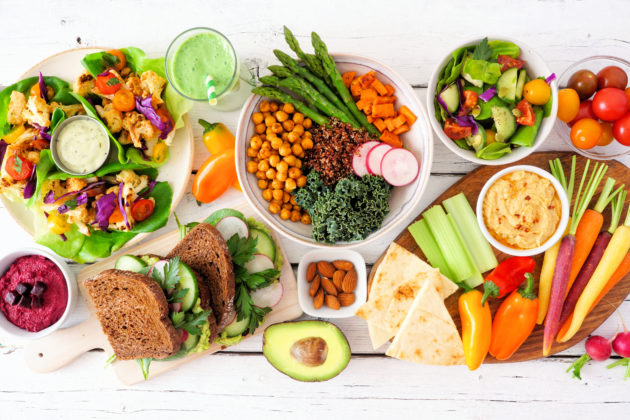By Saba Zahid, RD, LDN
One of the main reasons we enjoy eating is the sensory pleasure food can give us. A sudden decrease in appetite or the inability to taste well can have real effects on health – especially for vulnerable populations like those undergoing cancer treatment. Sometimes, changes in taste can impact patients’ willingness to take needed nutrition supplements. Unidine’s pioneering Fresh Benefits® program is a great way to ensure patients are getting enough calories and nutrients, using fresh foods that actually taste good!
Cancer patients often experience malnutrition and weight loss as side effects of treatment.1-3 Malnutrition in cancer patients has been found to be associated with unplanned hospital admissions, infections, reduced quality of life, and poor outcomes.2,3 A decline in nutrition status can usually be attributed to reduced dietary intake,1 since symptoms such as dry mouth, taste changes, diarrhea, and decreased appetite are often reported by patients undergoing cancer treatment.1 It is these symptoms that are often attributed to reduced oral intake and nutrition deterioration in patients with cancer.4
Diminished taste function has also been reported by some patients and has been associated with reduced caloric intake in patients receiving chemotherapy treatment.5 Taste changes have found to impact the palatability of oral nutrition supplements, a common nutrition intervention utilized as a means to increase caloric and protein intake. Considering the negative impact of malnutrition on numerous outcomes and looking more specifically at how taste changes influence food experiences and overall energy intake in patients with cancer, it is important to understand food preferences of patients undergoing cancer treatment.
An independent survey of patients receiving a cancer treatment at a Unidine partnered facility found that 89% of respondents indicated that they wanted foods that tasted good. Meanwhile, 44% of patients were interested in foods with high nutritional value. Sixty-three percent of the respondents preferred food items that were sweet. Although nutrition experts agree that patients receiving cancer treatment need calories and protein from high-quality, nutrient-dense foods, the results of this study show that what patients actually desire may differ from what they need or clinicians recommend.
Fortunately, it is possible to meet both the desires and needs of this patient population. Oncology dietitians often recommend patients focus on consuming foods that they enjoy and still find palatable while finding ways to increase the nutrition value of these favorite food items. Unidine’s signature program, Fresh Benefits®, has combined the nutrition expertise of registered dietitians with the culinary talent of trained chefs to create signature recipes with this specific recommendation in mind. Fresh Benefits® recipes take familiar foods such as mashed potatoes, mac and cheese, and pudding and packs in more nutrition by using caloric and protein dense ingredients, such as heavy cream, cheese, and dry milk. A serving of Fresh Benefits® pudding contains 346 calories and 14 grams whereas a name-brand pudding cup contains 120 calories and 2 grams of protein. The Fresh Benefits pudding also contains more calories and protein than a nutrition supplement (Boost™ pudding contains 240 calories and 7 grams of protein). Because Fresh Benefits recipes use only fresh ingredients, individuals do not get an aftertaste of vitamins and minerals, a common complaint when patients use medical nutrition supplements; this results in greater oral intake.
Saba Zahid is a Registered Dietitian and a Patient Experience Manager at Unidine.
Unidine’s network of on-staff nutrition professionals draw on their certified expertise and clinical specialties to develop innovative nutritional programming. At Unidine partnered facilities, 450+ Registered Dietitians work in collaboration with culinarians to foster a holistic approach to regulatory compliance, improved health outcomes and wellness education.
References:
- Neoh MK, Abu Zaid Z, Mat Daud ZA, et al. Changes in Nutrition Impact Symptoms, Nutritional and Functional Status during Head and Neck Cancer Treatment. Nutrients. 2020;12(5):1225.
- de Vries YC, van den Berg MMGA, de Vries JHM, et al. Differences in dietary intake during chemotherapy in breast cancer patients compared to women without cancer. Supportive care in cancer. 2017;25(8):2581-2591.
- Marshall KM, Loeliger J, Nolte L, Kelaart A, Kiss NK. Prevalence of malnutrition and impact on clinical outcomes in cancer services: A comparison of two time points. Clinical nutrition (Edinburgh, Scotland). 2019;38(2):644-651.
- Tong H, Tong H, Isenring E, Isenring E, Yates P, Yates P. The prevalence of nutrition impact symptoms and their relationship to quality of life and clinical outcomes in medical oncology patients. Supportive care in cancer. 2009;17(1):83-90.
- Boltong A, Keast R, Aranda S. Experiences and consequences of altered taste, flavour and food hedonics during chemotherapy treatment. Supportive care in cancer. 2012;20(11):2765-2774.

